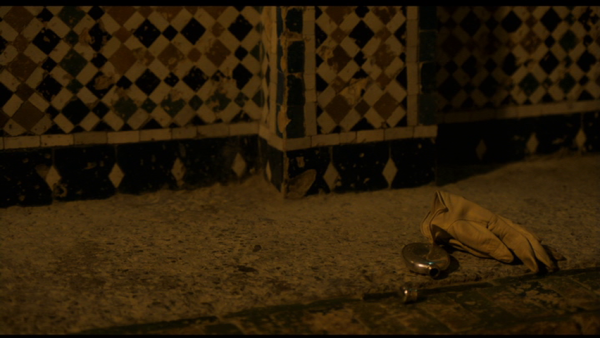

Tangier in Only Lovers Left Alive.
Yasmine Hamdan – Hal
You've got to dig to dig it, you dig?
Untitled (A place to stand and stare; Aubade East–Today’s the day, I can taste it / This morning there ain’t nothing I can’t do)
Untitled (A place to stand and stare; Aubade East–then play the rest of the day / as it comes see where it goes / feeling good / feeling good)
Aubade: East by Rita Dove
Harlem, a.m.
Today’s the day, I can taste it.
Got my gray sweats pouting in a breeze
so soft, I feel like I’m still wrapped for sleeping
as I head uptown in my undercover power-suit,
bitch sunlight fingering the spaced-out tenements.
This morning there ain’t nothing I can’t do.
This is my territory, I know all of it—
ten long blocks flanked by mighty water.
Walking any Avenue is like riding
a cosmic surfboard on the biggest wave
of the goddam century, the East River
twerking her bedazzled behind
while sky spills coin like a luck-crazed
Vegas granny flush at the slots. Today
I’m gonna make out like a bandit myself:
hook up with my buds to drop
a few shots on the courts, ogle the ladies,
then play the rest of the day
as it comes see where it goes
feeling good
feeling good
somewhere over the Hudson
the sun heading home
via The Georgia Review, Spring 2016 and Playlist for the Apocalypse: Poems.

“And if a glass of ice tea and an anthology
of seventeen century devotional poetry
with a dark blue cover are available,
then the picture can hardly be improved
All I wanted was to be a pea of being
at rest inside the pod of time”
-Billy Collins, The Moment

“Deep in the shady sadness of a vale
Far sunken from the healthy breath of morn,
Far from the fiery noon, and eve’s one star,
Sat gray-hair’d Saturn, quiet as a stone,
Still as the silence round about his lair;
Forest on forest hung about his head
Like cloud on cloud.”
– John Keats, Hyperion.
“But you offer, saturnine traveler,
with what eloquence in mute space
consolation to him whose life is broken”
-Luis Carlos López, Versos a la luna

“… did not need much
To make us laugh instead, and touch,”
-A.E. Stallings, “Recitative,” from Poetry (April 2005).
Why should the Devil get all the good tunes,
The booze and the neon and Saturday night,
The swaying in darkness, the lovers like spoons?
Why should the Devil get all the good tunes?
Does he hum them to while away sad afternoons
And the long, lonesome Sundays? Or sing them for spite?
Why should the Devil get all the good tunes,
The booze and the neon and Saturday night?
-A. E. Stallings, “Triolet on a Line Apocryphally Attributed to Martin Luther” from Poetry, April 2005.
Tar babies are
not the children
of tar people.
It is far worse.
The tar baby occurs
spontaneously
nor do we adhere
at first. There is
an especially
unperverse
attractiveness
to the tar baby–
although currently
she is a little sick.
When you start
to help her
is when she
start to stick.
Kay Ryan, “Tar Babies“
“It doesn’t melt
or turn over,
break or harden,
so it can’t feel
pain,
yearning,
regret.
[…]
Here,
it’s all yours, now—
but you’ll have
to take me,
too.”
–Rita Dove, Heart to Heart


Tom Whyman on Michael Rakowitz’s Waiting Gardens at Baltic Centre for Contemporary Art in Gateshead. (ArtReview)
“At their best, such shows can really become a part of your life … I could see myself making a habit of dwelling in The Waiting Gardens of the North – not necessarily to play …, but perhaps just to sit, to read, to be. This, as I say, is a dream of public space: exactly the sort of place one wishes would be there to occupy, whenever one wanted to, in a city. Contrast this with the actual public spaces we tend to get: increasingly dirty, poorly maintained, or just exclusive; public-private space where in theory you could be booted out at any time, actual public space where the architecture has been designed to be hostile to certain members of the public (most obviously, people experiencing homelessness).
Wouldn’t it be good, if at least some of these experiments were able to make at least some sort of permanent impact on our physical, public reality? The art shows us something new: some different way our public space might be. […] Here the art suffers from a problem endemic, I think, to society in general: we can see the better, we know we might be able to arrange, and to live in, a better world. And yet we have absolutely no clue as to how we might get there [permanently]
If Waiting Gardens is able to suggest an answer, I think it lies in the sensory experiences the exhibition presents us with, the immediacy of its sights and smells. This temporary space enlivens us to what reality has to offer”
“an explosion brought down Prigozhin’s private jet as it was flying” over Russian territory. Everyone reports as Putin’s revenge. The Prigozhin affair reads partly as fiction that I don’t like, where characters’ hubris lead them to take actions that can’t possibly end well nor offer good lessons. (New Yorker)
Joshua Yaffa’s long and though article on Yevgeny Prigozhin and Wagner. (New Yorker)